Sviatlana Tsikhanouskaya
Sviatlana Tsikhanouskaya | |
|---|---|
Святлана Ціханоўская | |
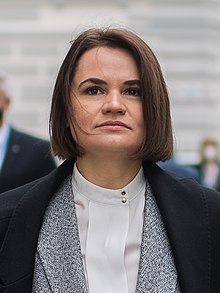 Tsikhanouskaya in 2021 | |
| President of the Coordination Council of Belarus | |
| Assumed office 14 August 2020 | |
| Cabinet Head | Herself |
| Preceded by | Office established |
| Head of the United Transitional Cabinet | |
| Assumed office 9 August 2022 | |
| President | Herself |
| Preceded by | Office established |
| Personal details | |
| Born | Sviatlana Heorhiyeuna Pilipchuk 11 September 1982 Mikashevichy, Brest Region, Soviet Union |
| Political party | Independent |
| Spouse | |
| Children | 2 |
| Education | Mozyr State Pedagogical University |
| Website | tsikhanouskaya |
Sviatlana Hieorhiyeuna Tsikhanouskaya[a] (née Pilipchuk;[b] born 11 September 1982) is a Belarusian political activist. After standing as a candidate in the 2020 presidential election against the president Alexander Lukashenko, she has led the political opposition to his authoritarian rule through an oppositional government operating from Lithuania and Poland.
Tsikhanouskaya became an opposition leader after her husband, Syarhei Tsikhanouski, ran as a presidential candidate in the 2020 presidential election. He was arrested, along with most other opposition leaders, and, as she was unable to file for the presidency on his behalf, Tsikhanouskaya entered herself into the race as a candidate. Lukashenko allowed her candidacy because he believed that a woman could not form legitimate opposition. She ran on a platform of constitutional reform, seeking free and fair elections with term limits on the presidency, and she pledged to step down once this was implemented. After Lukashenko was declared the victor, she was held by Belarusian authorities and then forced into exile in Lithuania. Election observers consider the election fraudulent, and Lithuania has recognized Tsikhanouskaya as the legitimate head of state of Belarus.
Since fleeing to Lithuania, Tsikhanouskaya has established an oppositional government. She established the Coordination Council in 2020 and the United Transitional Cabinet in 2022. As a representative of a democratic Belarus, Tsikhanouskaya has met with several world leaders in a diplomatic capacity to negotiate sanctions against Lukashenko's government and to deny him recognition as a legitimate head of state. During the Russian invasion of Ukraine, she has been an advocate of increased Western support for Ukraine, while also warning that Russia's actions should not overshadow opposition to the dictatorship in Belarus. Tsikhanouskaya was tried in absentia by the Belarusian government in 2023 and sentenced to fifteen years in prison.
Early life
[edit]Sviatlana Pilipchuk was born on 11 September 1982, in the village of Mikashevichy,[1] to Hieorhij Ivanavič and Valancina Mikałajeuna Pilipčuk.[2] Her father was a driver at a concrete factory, and her mother was a cafeteria cook. She grew up in a Soviet prefabricated apartment building, where she spent much of her time reading.[1] Among her books were some from the United States, which she read to learn English and learn about the world outside of Belarus.[3]
Pilipchuk's village was near the Chernobyl exclusion zone. When she was twelve years old, she was taken to Roscrea, Ireland, by the Chernobyl Lifeline charity, which helped children travel so as to reduce their exposure to radiation. Though Pilipchuk was not as affected by radiation as other students, her proficiency in school earned her a spot.[3] While staying in Ireland, she would translate for the other children. Pilipchuk lived with a host family, the Deanes, who effectively became second parents to her.[4] She returned over the following three summers, and she felt that Ireland was a more cheerful place than Belarus.[3] Even after she stopped visiting Ireland, she has stayed in contact with the Deanes in adulthood.[4]
Pilipchuk attended Mozyr State Pedagogical University to study teaching.[4] While she was in Mazyr, she met nightclub owner Syarhei Tsikhanouski in 2003. They married in 2004, and she took the name Sviatlana Tsikhanouskaya.[3] Together they had two children: a son and a daughter, about five years apart. Her son was born mostly deaf, and much of her time went to assisting him. She moved from Minsk to Gomel where he could receive treatment, including a cochlear implant.[4] Until 2020, Tsikhanouskaya was an English teacher and interpreter.[5][6][7] She retired so she had more time to raise her children.[4] She pulled her children out of school when the COVID-19 pandemic developed, as the government had not taken any prevention measures.[3]
2020 Belarusian presidential election
[edit]Background and building a campaign
[edit]In 2019, Tsikhanouskaya's husband Tsikhanouski started a YouTube channel, "A Country for Life", in which he interviewed people and challenged the rule of Belarusian president Alexander Lukashenko.[1] He became a prominent opposition leader through his YouTube and Telegram presence, as well as his organization of political protests. He moved to challenge Lukashenko in the 2020 presidential election, and he was subsequently arrested for his protest activity days before the filing deadline.[3][8]: 122–123 Tsikhanouskaya attempted to file for her husband by proxy but was rejected. In response, she filed for her own candidacy.[8]: 123 She later said that she did this solely as a show of support for her husband.[1] Tsikhanouskaya registered as an Independent candidate on 14 July 2020.[9]
Tsikhanouskaya initially had no interest in building a campaign. When her husband was released, he continued the campaign even though it was her name on the paperwork. He sometimes brought a life-size cutout of Tsikhanouskaya when he campaigned. She easily acquired the 100,000 signatures that were needed to run—a high limit that was expected to block opposition candidates from running.[3] Her candidacy was confirmed on 19 July 2020. From this day, she traveled across Belarus to hold campaign events.[10]
Tsikhanouski was arrested a second time, accused of assaulting a police officer in an incident that was later found to be staged.[3] With her husband imprisoned, Tsikhanouskaya became the main opposition candidate against Lukashenko in the presidential election,[8]: 123 making her a rare example of an opposition leader in an autocratic nation that arose through a political campaign.[8]: 120 She aligned with Veronika Tsepkalo, the wife of opposition candidate Valery Tsepkalo who had fled the country, and Maria Kalesnikava, the campaign manager of opposition candidate Viktar Babaryka, who was arrested.[8]: 123
2020 was a time of political vulnerability for Lukashenko. He had grown more unpopular because of his mishandling of economic issues and his dismissive response to the COVID-19 pandemic in Belarus.[1][8]: 122 Most opposition candidates were removed from the race, either through arrest or disqualification.[8]: 123 Lukashenko allowed Tsikhanouskaya's candidacy, believing that as a woman she was not a significant political threat. He instead belittled her for being a female political candidate, using sexist language.[1][8]: 119 Tsikhanouskaya leaned into the feminine aspects of her candidacy, emphasizing that she was a mother, and her gender may have indicated to voters that she was less likely to seek power for herself.[1][8]: 124
Instead of running as a protest candidate, encouraging a boycott as her husband had intended, she built a campaign.[1] Tsikhanouskaya described herself as an "accidental candidate", and she said that she would only hold office until the Lukashenko dictatorship was seen to an end.[8]: 120 Her role in the campaign was to serve as a face for the opposition movement rather than to engage in politics. Her role has been compared to Joan of Arc by the Belarusian press.[4] She said of the campaign that "every day was full of fear".[1]
Campaigning
[edit]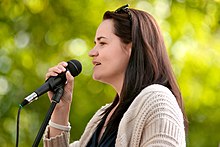
Though she was running as an independent candidate, Tsikhanouskaya attracted support from across the spectrum of Belarus's political opposition. Vital Rymasheuski, co-leader of Belarusian Christian Democracy, announced his party's support, as did the Belarusian Social Democratic Party (Assembly), United Civic Party of Belarus, and Belarusian Women's Party "Nadzieja".[11][12] She also received support from 2010 presidential candidate Mikola Statkevich,[12] and president of the Rada of the Belarusian Democratic Republic, Ivonka Survilla.[13] Tsikhanouskaya's shared experience with the other wives of arrested dissidents earned her many supporters among women.[8]: 124 Rallies in support of Tsikhanouskaya and in opposition to Lukashenko were the largest in the history of post-Soviet Belarus, attracting crowds of 20,000 in Brest and 220,000 in Minsk.[14][6] Tsikhanouskaya had no political experience, and she had to be taught how to speak to the media.[1] This endeared her to voters and protesters, who saw her as an ordinary citizen like themselves. Her open dislike of politics fueled this response.[3]
During the presidential campaign, Tsikhanouskaya was repeatedly threatened,[15] recounting threatening phone calls from unknown numbers, which said, "We will put you behind bars and place your children in an orphanage".[6] Tsikhanouskaya said she then decided to persevere in her campaign, saying that "there must be a symbol of freedom".[6] Her campaign began as Amnesty International condemned Belarus's discriminatory treatment of women opposition activists, including threats of sexual violence[16] and threats by authorities to take children away from opposition figures and send them to state-run orphanages.[16][17] Worried for the safety of her children, Tsikhanouskaya had them hidden abroad in Lithuania.[1]
Tsikhanouskaya said that she ran for president out of love, to free her husband from prison.[18] She ran on only three political issues: the release of political prisoners, constitutional limitations on the presidency, and new elections. Once these three things happened, she said, she would step down from the presidency.[3] To reform the constitution, she pledged to set a referendum on returning to the original draft of the 1994 Belarusian constitution, reinstating a limit of two terms for the president.[19][20] She also vowed to move away from the union treaty with Russia.[6] She said that her main goal was to establish free and fair elections. She viewed the election as illegitimate due to the government's refusal to register Lukashenko's main political opponents as candidates. She pledged to deliver a plan for transparent and accountable elections within six months of taking office.[21]
Tsikhanouskaya's economic platform emphasized increasing the importance of small and medium-sized businesses in the Belarusian economy. She planned to offer interest free loans to small and medium-sized businesses, cancel state inspections of private entities, and provide legal protection for foreign investors. She planned to allow profitable state owned enterprises to continue to operate, while requiring unprofitable state owned enterprises to take advice from outside professionals.[22]
Election day and departure from Belarus
[edit]
The night before the election, police detained senior staffers from Tsikhanouskaya's campaign and she chose to go into hiding in Minsk, before re-emerging on election day at a polling station.[19] When the results were announced, Tsikhanouskaya officially received only ten percent of the vote. Poll workers were required to engage in electoral fraud to ensure Lukashenko's victory over Tsikhanouskaya,[8]: 125 and protests took place across Belarus in response.[4] According to election monitor Golos and independent observers, Tsikhanouskaya was the legitimate winner of the election.[23] After Belarusian state television released an exit poll showed Lukashenko winning by an overwhelming margin, Tsikhanouskaya said that she didn't trust that poll, saying, "I believe my eyes, and I see that the majority is with us".[24]
Tsikhanouskaya and her lawyer went to the Central Election Commission the following day, where they were confronted by armed guards, and Tsikhanouskaya was forced to meet with Lukashenko's enforcer Andrei Pavlyuchenko. She was given an ultimatum to either leave the country, or to go to prison and have her children taken.[3] They described to her in detail what life in prison would be like for her, where political prisoners were frequently tortured, and what life for her children would be like as wards of the state. She attempted to negotiate the release of her husband in exchange for ending her challenge and leaving the country. Her offer was refused, but instead she was able to negotiate the release of her campaign manager, Maria Moroz. Tsikhanouskaya and Moroz prepared to leave for Lithuania; Tsikhanouskaya collected her passport and her son's cochlear implant equipment, while Moroz arranged to have her own children escorted to Lithuania by her sister. The women also demanded that a Belarusian KGB agent escort them to the border in Moroz's car, to prevent the use of a car bomb.[1]
A video was released of Tsikhanouskaya conceding to Lukashenko and asking the protesters to stand down.[4] The stark change in demeanor and message led allies to say that the video had been coerced, with some going as far as to liken it to a hostage video.[25][26]
Exile
[edit]Establishing an opposition government-in-exile
[edit]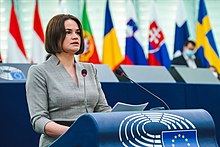
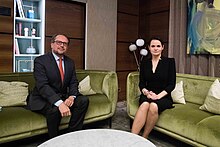
On 11 August 2020, Lithuanian foreign minister Linas Linkevičius announced that Tsikhanouskaya was safe in Lithuania while also acknowledging that she had "few options".[27] She felt that she had "betrayed" her supporters by leaving the country.[3] The same day, the State Security Committee of Belarus (KGB) alleged that an attempt was being made on Tsikhanouskaya's life, saying that the protesters needed a "sacred sacrifice".[28]
Days after she left the country, Tsikhanouskaya declared herself the "leader of democratic Belarus".[3] To this effect, she announced the establishment of a Coordination Council to handle the transfer of power from Lukashenko.[29] Applications for membership in the council were open only to Belarusian authority figures, such as respected professionals, authors, or sportspeople.[30] Tsikhanouskaya considered herself to be an "interim-leader" of Belarus, but she has not claimed an entitlement to the presidency. She has indicated that she will not seek the presidency again, instead continuing her diplomatic work until fair elections can be held.[1]
Tsikhanouskaya appealed to the international community to recognise her as the winner, traveling to various European capitals and meeting with world leaders, including President Joe Biden, Chancellor Angela Merkel, President Emmanuel Macron, President Ursula von der Leyen, President Charles Michel, Prime Minister Justin Trudeau. Western nations and the European Parliament have generally opted not to recognise Lukashenko's reelection.[3][31] She has also sought sanctions against Belarus, speaking with world leaders in an effort to get them applied.[32][33] After a period of protest, Lukashenko regained de facto control over the nation. Tsikhanouskaya has denied that she leads a government in exile, saying that she wished to create a "permanent opposition inside Belarus".[3] The nation of Lithuania has recognized Tsikhanouskaya as the legitimate leader of Belarus.[34]
On 9 August 2022, at a conference held in Vilnius, Tsikhanouskaya announced the creation of the United Transitional Cabinet. It initially consisted of Pavel Latushko (responsible for the transition of power), Aliaksandr Azarau (responsible for the restoration of law and order), Valery Kavaleuski (foreign affairs), and Valery Sakhashchyk (defense and national security).[35] Belarus declared Tsikhanouskaya's organizations to be extremist formations in January 2023, making her subject to prison time should she be captured by the Belarusian government.[36] Two months later, she was tried in absentia and sentenced to fifteen years in prison.[37]
European Parliament and a number of governments recognize Tsikhanouskaya and her structures as legitimate representative of the Republic of Belarus.[38] Tsikhanouskaya is often referred by foreign government representatives, diplomats and parliamentarians as "President", "President-elect", "Leader of Democratic Belarus", while her Cabinet is referred as "government in exile."[39][40][41]
The Council of Europe, the European Union and the United States of America have established the formal cooperation with the structures of Sviatlana Tsikhanouskaya.[42][43][44]
Russo-Ukrainian War
[edit]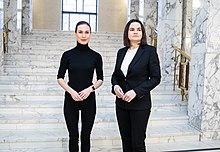
When the Russian invasion of Ukraine took place in 2022, Tsikhanouskaya sought to promote the anti-war movement in Belarus.[8]: 125 She has objected to the international framing of Belarus as merely a vassal state of Russia, alleging that it downplays the severity of Lukashenko's rule.[23] Regarding Lukashenko's support of the invasion, Tsikhanouskaya accused him of treason.[45]
Following Belarus's entry into the war, Tsikhanouskaya and her supporters developed the Pieramoha Plan (Victory Plan), a strategy involving underground dissidents in Belarus, engaging in information sharing and sabotage. She has said that the dissidents must wait until "the right moment", when instability allows for a change in power.[46]
Tsikhanouskaya argues that the existence of a dictatorship in Belarus threatens the safety not only of Ukraine, but of the other states bordering Belarus: Latvia, Lithuania, and Poland, as Belarus has been used by Russia to attack neighboring countries like Ukraine. She supports continued political and economic involvement by the West in support of Ukraine's efforts in the Russo-Ukrainian War. She has warned of war fatigue stymieing Western support for Ukraine and Belarusian dissidents.[31]
Awards
[edit]Tsikhanouskaya was on the 2020 list of the BBC's 100 Women, announced on 23 November 2020,[47] and was included in the 2020 edition of The Bloomberg 50.[48] Tsikhanouskaya and other Belarusian opposition leaders were awarded the European Parliament's 2020 Sakharov Prize for Freedom of Thought in a ceremony on 16 December in Brussels.[49][50] Among dozens of distinctions, she is a recipient of the 2020 Globsec prize for freedom; 2022 International Four Freedoms Award; 2022 International Trailblazer Award; 2022 Tipperary International Peace Award, 2023 IDU Bush-Thatcher Award for Freedom; 2023 NATO PA “Women for Peace and Security” Award; 2023 Anna Lindh Prize laureate. She and other Belarusian opposition leaders won the 2022 Charlemagne Prize.[51]
In 2021, she was nominated for the 2021 Nobel Peace Prize by President of Lithuania Gitanas Nausėda and multiple Norwegian members of parliament.[52][53][54]
See also
[edit]- 2020–2021 Belarusian protests
- Belarusian partisan movement (2020–present)
- Belarusian opposition
- New Belarus passport project
Notes
[edit]- ^ Belarusian: Святлана Георгіеўна Ціханоўская, pronounced [sʲvʲaˈtlana ɣʲɛˈɔrɣʲijɛwna t͡sʲixaˈnɔwskaja]; Russian: Светлана Георгиевна Тихановская, romanized: Svetlana Georgiyevna Tikhanovskaya, pronounced [svʲɪˈtlanə ɡʲɪˈorɡʲɪ(j)ɪvnə tʲɪxɐˈnofskəjə]. Also romanized as Sviatłana Hieorhijeŭna Cichanoŭskaja in Łacinka and Svetlana Georgyevna Tikhanovskaya from Russian.
- ^ Belarusian: Піліпчук, pronounced [pʲilʲipˈt͡ʂuk]; Russian: Пилипчук, romanized: Pilipchuk, pronounced [pʲɪlʲɪpˈtɕuk]
References
[edit]- ^ a b c d e f g h i j k l m Mackinnon, Amy (6 August 2021). "Belarus's Unlikely New Leader". Foreign Policy. Retrieved 23 September 2023.
- ^ "Тихановская: Каждый год режим воспевал войну, чтобы однажды помочь Кремлю начать новую". Наша Ніва (in Russian). 9 May 2022. Archived from the original on 4 February 2023. Retrieved 4 February 2023.
- ^ a b c d e f g h i j k l m n o Filkins, Dexter (6 December 2021). "The Accidental Revolutionary Leading Belarus's Uprising". The New Yorker. ISSN 0028-792X. Retrieved 23 September 2023.
- ^ a b c d e f g h Specia, Megan (13 August 2020). "Who Is Svetlana Tikhanovskaya, Belarus's Unlikely Opposition Leader?". The New York Times. ISSN 0362-4331. Archived from the original on 14 December 2020. Retrieved 23 September 2023.
- ^ Bennetts, Marc (6 June 2020). Written at Moscow. "Svetlana Tikhanovskaya: Housewife steps into election fight with Belarus strongman Lukashenko". The Times. London. Archived from the original on 24 August 2020. Retrieved 22 August 2020.
- ^ a b c d e Karmanau, Yuras (4 August 2020). "Ex-teacher hopes to free Belarus from president's iron fist". AP News. Retrieved 1 October 2023.
- ^ "Tsikhanouskaya: Belarus Authorities Are Scared Because So Many People Oppose Them". Radio Free Europe/Radio Liberty. 4 August 2020.
- ^ a b c d e f g h i j k l m Jalalzai, Farida; Jurek, Steve (3 February 2023). "The "Accidental Candidate" Versus Europe's Longest Dictator: Belarus's Unfinished Revolution for Women". Politics and Governance. 11 (1): 119–129. doi:10.17645/pag.v11i1.6167. hdl:20.500.12648/8626. ISSN 2183-2463.
- ^ Kalinovskaya, Tatiana (20 July 2020). "In Belarus, 3 Women Unite to Fight Strongman Lukashenko". The Moscow Times.
- ^ Mateo, Emma (4 March 2022). ""All of Belarus has come out onto the streets": exploring nationwide protest and the role of pre-existing social networks". Post-Soviet Affairs. 38 (1–2): 29. doi:10.1080/1060586X.2022.2026127. ISSN 1060-586X.
- ^ Свабода, Радыё (23 July 2020). "БСДП (Грамада) заклікала галасаваць за Ціханоўскую і адстойваць права на свабодныя выбары". Радыё Свабода (in Belarusian). Retrieved 23 October 2023.
- ^ a b Пілецкі, Алесь (22 July 2020). "Статкевіч, Кавалькова, Хашчавацкі, АГП і БХД. Хто падтрымлівае Сьвятлану Ціханоўскую". Радыё Свабода (in Belarusian). Retrieved 23 October 2023.
- ^ Moloney, Anastasia (26 August 2020). "'Keep on Fighting', veteran female leader tells young Belarusians". Reuters. Archived from the original on 26 August 2020. Retrieved 27 August 2020.
- ^ "Будзьма беларусамі! » Беларусь у 2010-м і ў 2020-м. Усё было зусім па-іншаму?". budzma.org. Retrieved 3 February 2024.
- ^ Karmanau, Yuras (19 July 2020). "Belarus rally for presidential challenger largest in years". Associated Press. Archived from the original on 23 July 2020. Retrieved 7 August 2020.
- ^ a b "Belarus: Authorities threatening women political activists ahead of election". www.amnesty.org.uk. Retrieved 23 October 2023.
- ^ Seddon, Max (31 July 2020). "Support surges for wife of jailed Belarus YouTuber fighting Lukashenko's grip". Financial Times. Retrieved 23 October 2023.
- ^ "Newsday - President Trump: Coronavirus "will get worse" - BBC Sounds". www.bbc.co.uk. Retrieved 23 October 2023.
- ^ a b Roth, Andrew; Auseyushkin, Yan (9 August 2020). Written at Moscow and Minsk. "Opposition candidate comes out of hiding as Belarus votes". The Guardian. London. Archived from the original on 9 August 2020. Retrieved 9 August 2020.
- ^ Дашчынскі, Алесь (27 July 2020). ""Можа прынесьці прысягу на вернасьць Канстытуцыі 1994 году". Ціханоўская абяцае новыя выбары. Ці законна гэта?" ["May take an oath of allegiance to the 1994 Constitution." Tikhonov promises new elections. Is it legal?]. Радыё Свабода (in Belarusian). Archived from the original on 30 July 2020. Retrieved 9 August 2020.
- ^ Свабода, Радыё (21 July 2020). "«У Лукашэнкі вельмі нізкі рэйтынг». Што Ціханоўская сказала ў сваім першым выступе на тэлевізіі. ВІДЭА". Радыё Свабода (in Belarusian). Retrieved 1 October 2023.
- ^ "Что предлагают в экономике альтернативные кандидаты в президенты: читаем предвыборные программы" [What alternative presidential candidates offer in the economy: we read the election programs]. bel.biz (in Russian). 27 July 2020. Archived from the original on 1 November 2020. Retrieved 20 August 2020.
- ^ a b Loginova, Olga (23 August 2023). "'Belarus's people are still resisting': exiled leader calls for west's support". The Guardian. ISSN 0261-3077. Retrieved 23 September 2023.
- ^ "Belarus election: Clashes after poll predicts Lukashenko re-election". BBC News. 10 August 2020. Archived from the original on 11 September 2020. Retrieved 10 September 2021.
- ^ "Challenger fled Belarus 'for sake of her children'". BBC News. 12 August 2020. Archived from the original on 24 May 2021. Retrieved 12 August 2020.
- ^ Seddon, Max (11 August 2020). "Belarus protesters decry pressure that forced their leader to flee". Financial Times. Archived from the original on 16 August 2020. Retrieved 12 August 2020.
- ^ "Belarus opposition leader 'had few options' - Lithuanian FM". Reuters Video. 11 August 2020. Archived from the original on 9 November 2023. Retrieved 24 October 2023.
- ^ "Тихановская в видеообращении объяснила отъезд из Белоруссии" [Tikhanovskaya explained her departure from Belarus in a video message] (in Russian). Moscow: RIA Novosti. 11 August 2020. Archived from the original on 18 August 2020. Retrieved 20 August 2020.
- ^ "Belarus opposition candidate declares victory | NHK WORLD-JAPAN News". NHK World-Japan. 14 August 2020. Archived from the original on 16 August 2020. Retrieved 20 August 2020.
- ^ Grekowicz, Nikita (16 August 2020). "Łukaszence został już tylko Putin, Cichanouska wzywa do lokalnego przejmowania władzy" [Lukashenko has only Putin left, and Cichanouska is calling for a local takeover of power]. OKO.press (in Polish). Archived from the original on 16 August 2020. Retrieved 20 August 2020.
- ^ a b Yasmeen, Serhan (19 October 2022). "The West Can't Afford To Forget About Belarus". Time. Retrieved 23 September 2023.
- ^ "Belarus opposition leader asks for more U.S. sanctions". Reuters. 20 July 2021. Archived from the original on 20 July 2021. Retrieved 20 July 2021.
- ^ Filatova, Irina (13 June 2021). "Belarus opposition leader says 'harsh' sanctions needed". DW. Retrieved 23 September 2023.
- ^ "Lithuania Gives Belarusian Opposition Official Status". Radio Free Europe/Radio Liberty. 5 July 2021. Retrieved 24 October 2023.
- ^ "On Second Anniversary Of Disputed Belarusian Presidential Poll, Tsikhanouskaya Names 'Interim Cabinet'". Radiofreeeurope/Radioliberty. Archived from the original on 3 October 2022. Retrieved 22 August 2022.
- ^ "Сотрудников Офиса Тихановской записали в экстремисты". Voice of America (in Russian). 27 January 2023. Retrieved 22 March 2023.
- ^ "Тихановскую приговорили к 15 годам колонии". РБК (in Russian). 6 March 2023. Archived from the original on 6 March 2023. Retrieved 6 March 2023.
- ^ "The EU needs to comprehensively review its relations with Belarus | News | European Parliament". www.europarl.europa.eu. 21 October 2020. Retrieved 3 February 2024.
- ^ "Глава немецкой делегации в ПАСЕ назвал команду Тихановской "правительством в изгнании"". pozirk.online (in Russian). Retrieved 3 February 2024.
- ^ "Министр иностранных дел Польши назвал Светлану Тихановскую президенткой | Новости Беларуси | euroradio.fm". euroradio.fm (in Russian). 14 December 2023. Retrieved 3 February 2024.
- ^ "NATO PA". Sviatlana Tsikhanouskaya, Belarusian Democratic Leader, to receive 2023 NATO PA “Women for Peace and Security” Award | NATO PA. 25 November 2023. Retrieved 3 February 2024.
- ^ "First Strategic Dialogue between the United States and the Belarusian Democratic Movement and Civil Society". United States Department of State. Retrieved 3 February 2024.
- ^ "Secretary General opens first meeting of Contact Group on Belarus with democratic opposition representative Tsikhanouskaya - Portal - www.coe.int". Portal. Retrieved 3 February 2024.
- ^ "Belarus: High Representative/Vice-President Josep Borrell launches a new Consultative Group with democratic forces and civil society | EEAS". www.eeas.europa.eu. Retrieved 3 February 2024.
- ^ Marnin, Julia (26 February 2022). "Do countries friendly to Russia support its Ukraine invasion? What 8 of them have said". Miami Herald. Retrieved 26 February 2022.
- ^ Brewster, Murray (23 November 2022). "Exiled opponents of Belarus regime have a plan for victory — and it could start with Ukraine". CBC.
- ^ "BBC 100 Women 2020: Who is on the list this year?". BBC News. 23 November 2020. Archived from the original on 23 November 2020. Retrieved 23 November 2020.
- ^ "Svyatlana Tsikhanouskaya on this year's Bloomberg 50 list". belsat.eu. Archived from the original on 13 August 2021. Retrieved 5 December 2020.
- ^ "Belarus opposition leader Tsikhanouskaya awarded EU's Sakharov Prize". euronews. 16 December 2020. Archived from the original on 20 July 2021. Retrieved 20 July 2021.
- ^ "European Parliament Awards Sakharov Prize to Belarus Opposition | Voice of America - English". www.voanews.com. 16 December 2020. Archived from the original on 20 July 2021. Retrieved 20 July 2021.
- ^ "Belarusian opposition figures win Charlemagne Prize". Deutsche Welle. 25 May 2022. Archived from the original on 26 May 2022. Retrieved 26 May 2022.
- ^ "Flere fredsprisforslag før fristen gikk ut" [Several peace prize proposals before the deadline expired]. Aftenposten (in Norwegian). Norwegian News Agency. 31 January 2021. Archived from the original on 1 February 2021. Retrieved 1 February 2021.
- ^ Haug, Kenneth Kandolf (31 January 2021). "Hektisk nomineringsaktivitet før fredsprisfrist" [Hectic nomination activity before peace prize deadline]. Dagsavisen (in Norwegian). Archived from the original on 31 January 2021. Retrieved 1 February 2021.
- ^ "Lithaunian president nominates Belarus opposition leader for Nobel Peace Prize". Lithuanian National Radio and Television. lrt.lt. 31 January 2021. Archived from the original on 31 January 2021. Retrieved 31 January 2021.
External links
[edit]- Official website
- Nemtsova, A. (8 January 2023), "The Irreversible Change in Belarus", The Atlantic, retrieved 9 January 2023
- 1982 births
- Living people
- 20th-century Belarusian women
- 21st-century Belarusian politicians
- 21st-century Belarusian women
- 21st-century Belarusian women politicians
- 21st-century translators
- Belarusian democracy activists
- Belarusian educators
- Belarusian human rights activists
- Belarusian schoolteachers
- Belarusian women activists
- Belarusian women educators
- Candidates for President of Belarus
- Democracy activists
- Exiled politicians
- Independent politicians
- Interpreters
- People convicted in absentia
- People from Luninyets District
- Sakharov Prize laureates
- Women human rights activists
- Belarusian dissidents
